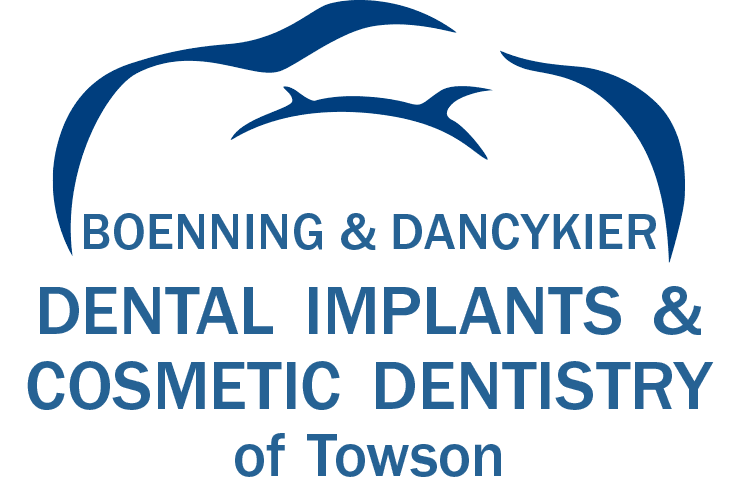Dental emergencies tend to sneak up on patients when they least expect them. Stay calm if you are experiencing a dental emergency and contact our dentist as soon as possible. Our Towson, MD, dental office will make every effort to immediately see patients who are experiencing a dental emergency.
Emergency Dentistry in Towson, MD
Towson dentists Dr. Keith Boenning and Dr. Nate Dancykier will help you restore your smile following a dental emergency. If you are unsure if you are experiencing a dental emergency or not, we recommend contacting our office directly. Sudden or unexpected pain, damage, or trauma to your dental structures are all dental emergencies.
We are happy to evaluate your oral health and attend to your emergency dental issues. The following are common dental emergencies that we treat in our Towson, MD, dental office.
Knocked-Out Teeth
Don’t panic if one of your permanent teeth falls out. Recover the knocked-out tooth if possible, and lift it up by the crown. Avoid touching the tooth roots, as this could cause further damage to the tooth. Once you recover the tooth, place it in a glass of milk or your own saliva.
This will keep the tooth moisturized while you are in transit to our dental office. We may be able to reattach the tooth if you visit our dentists in a timely manner. If you can not locate the knocked-out tooth, we can provide replacement options, such as a dental implant or a bridge.
Toothaches
Many reasons can cause you to experience a toothache. Cavities and gum disease cause toothaches because of irritation and buildup. Cracked or chipped teeth may also result in a toothache. Additionally, you may experience a toothache because of overcrowded or impacted teeth.
Take over-the-counter pain medication and apply a cold compress to your jawline. Then, see us so we can figure out the source of your pain and treat it accordingly. Have our dentist evaluate your toothache sooner rather than later to avoid further pain and discomfort.
Dental Crown Falls Off
Another dental emergency is if your dental crown falls off. Although a tooth can survive for several weeks without the protective crown, it is best to replace it as soon as possible. The first thing you should do is contact our office and schedule an appointment.
Dr. Dancykier will attempt to re-attach it, or place a new one. In the meantime, keep the dental crown clean and refrain from using the tooth. Call our emergency dental office and we will be happy to guide you through it.

Dental Emergency FAQs
Our Towson dental office is here to help no matter how minor or severe your emergency is. If you are not sure what to do or if you have questions about a certain dental situation, contact us.
Can the ER pull an infected tooth or broken tooth?
No, hospital emergency rooms and urgent care centers will not extract teeth. Emergency rooms may provide temporary relief for a broken tooth. However, they generally do not perform dental procedures like tooth extractions.
The best thing to do is visit a dentist or oral surgeon for a tooth extraction. Check to see if your dentist offers emergency dental services. Some local dentists like Dr. Keith Boenning and Dr. Nate Dancykier have emergency office hours. Schedule an appointment with our dental professionals as soon as possible.
Can I go to the emergency room for any dental issues?
The emergency room (ER) is not for dental problems unless it is a severe emergency like nonstop bleeding. The ER does not possess the necessary dental equipment or expertise to perform most dental procedures. ER, doctors can give you antibiotics if you have a toothache or infection. If you have a tooth infection, toothache, or broken tooth, it’s best to contact our emergency dentist first.
What should I do if I have a toothache?
If you have a toothache, it’s important to see a dentist as soon as possible. In the meantime, you can try some home remedies to alleviate your pain. You can start by rinsing your mouth with warm salt water or applying a cold compress to the problem area. Over-the-counter pain relievers like acetaminophen or ibuprofen can also help relieve the pain.
Avoid putting aspirin directly on the affected tooth or gums, which can cause irritation and damage. Remember that these remedies are only temporary solutions and won’t address the underlying cause of your toothache. You should see a dentist for proper diagnosis and treatment.
Is bleeding gums a dental emergency?
Bleeding gums are not always a dental emergency. However, they can be a sign of an underlying issue that a dentist needs to address. If your gums are bleeding regularly or excessively, schedule an appointment with our dentists as soon as possible.
Various factors can cause bleeding gums, including gum disease and poor oral hygiene. Our dentist can help determine the cause of your bleeding gums. We will recommend appropriate treatment to prevent further complications.
Do emergency dentists do root canals?
Yes, emergency dentists can perform root canals if necessary. However, not all emergency dentists offer root canal treatment. Call and ask about their services before scheduling an appointment. If you are experiencing severe dental pain outside regular dental office hours, contact an emergency dentist.
If you are currently experiencing a dental emergency, please contact our office directly. One of our helpful staff members will help you through the issue. At this point, we will determine if you need immediate treatment or schedule you for the next available appointment. We will also do our best to accommodate you as soon as possible.
